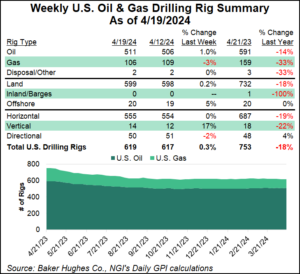Regulatory | Mexico | NGI All News Access
New Fuel Permit Rules in Mexico Said Damaging to Energy Sector Competition
© 2024 Natural Gas Intelligence. All rights reserved.
ISSN © 2577-9877 | ISSN © 2577-9966 |

Earnings
The timing for the next leg of growth in North America remains uncertain, but there’s “no question” that natural gas output will drive the market into 2025 and beyond because of LNG exports and rising electricity demand, Halliburton Co. CEO Jeff Miller said. Speaking to analysts during the first quarter conference call, Miller was asked…
April 23, 2024Energy Transition
By submitting my information, I agree to the Privacy Policy, Terms of Service and to receive offers and promotions from NGI.